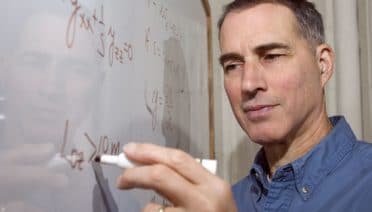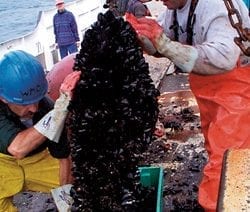Press Room
Geologists have recently devised a new method for reconstructing the history of severe storms along the coast: examine the steep slopes and cliffs left behind when severe wind and water erode the beach. After hurricanes and Nor’easters make landfall, they…
A lot of ocean science equipment goes into the water and never comes back. Some of it was intended to stay; other times, the sea claims it by force. Recently researchers used the WHOI-operated underwater vehicle Jason to take back…
When the levees broke in New Orleans after Hurricane Katrina, officials feared that Lake Pontchartrain might be infiltrated with disease-causing microbes from a “toxic gumbo” of water, polluted sediments, and sewage. In the weeks after the flood, scientists from several…
Arctic coastal environments are some of the most vulnerable to climate change. A team of WHOI researchers visited Canada’s Mackenzie River Delta in April 2007 to find out just how vulnerable. Marine geochemists Tim Eglinton, Daniel Montluçon, and Angie Dickens,…
A major study has shed new light on the dim layer of the ocean called the “twilight zone”where mysterious processes affect the ocean’s ability to absorb and store carbon dioxide accumulating in our atmosphere. The results of two international research…
Nearly four decades after a fuel oil spill polluted the beaches of Cape Cod, researchers have found the first compelling evidence for lingering, chronic biological effects on a marsh that otherwise appears to have recovered. Through a series of field…
Researchers from the Woods Hole Oceanographic Institution (WHOI) are venturing this month to the North Pole to deploy instruments that will make year-round observations of the water beneath the Arctic ice cap. Scientists will investigate how the waters in the…
Beginning April 18, the Woods Hole Oceanographic Institution (WHOI), in partnership with eight museums across the United States, will bring the excitement of polar research and discovery to students, teachers, museum visitors, and web viewers. Virtual explorers will be able…
Scientists have found one of the largest fields of seafloor vents gushing super-hot, mineral-rich fluids on a mid-ocean ridge that, until now, remained elusive to the ten-year hunt to find them.
CONTACTS: Karinna Sjo-Gaber Joint Oceanographic Institutions 202-232-3900 Joanne Tromp WHOI Media Relations 508-289-3340 The impacts of natural climate variability and the threat of anthropogenic climate change are issues that are increasingly being brought to public attention. There is growing interest…
One of the solutions offered for the global greenhouse gas problem is the fertilization of the ocean; that is, spreading iron into the open ocean to promote the growth of floating microscopic plants. In at least 12 experiments over the…
Scientists have long known that microorganisms can use one of two different methods to convert carbon dioxide into a form that living things can use for energy. What they didn’t know until recently is that at least one form of…
Climate is often discussed in global terms, but it is the regional and local effects that will matter most to everyday people. WHOI geologist Jeff Donnelly and colleagues are looking closely at the regional effects of a past period of…
Researchers from the Woods Hole Oceanographic Institution (WHOI) have found a new and substantial pathway for mercury pollution flowing into coastal waters. Marine chemists have detected much more dissolved mercury entering the ocean through groundwater than from atmospheric and river sources.
With growing global populations and ever-increasing demands for seafood, fish farms are expected to expand significantly over the next few decades. But is aquaculture economically sustainable? Do the benefits outweigh the costs when all of the relevant environmental factors are…
Whyvillians have a problem: harmful algae are threatening their beaches and coastal ecosystem. In order to investigate, understand, and mitigate the problem, citizens are turning to the Whyville Oceanographic Institution (WhOI), with its boats, its underwater laboratories, and other resources…
Oceanographer Jim Ledwell of the Woods Hole Oceanographic Institution (WHOI) has been selected as the winner of the 2007 Alexander Agassiz Medal, awarded by the U.S. National Academy of Sciences (NAS). Ledwell, a senior scientist in the Department of Applied…
Listen to the first call between ocean explorers and astronauts.
Media Advisory WHAT: Fire and Ice Climate Changes of the Past…and Future? A public debate on the lessons from a previous warm interval in Earth’s climate history The Third Elisabeth and Henry Morss Jr. Colloquium WHEN: Tuesday, January 30, 2007…
Congress should enact legislation to ensure that strong environmental standards are in place to regulate the siting and conduct of offshore marine aquaculture, according to an independent panel of leaders from scientific, policymaking, business, and conservation institutions. Organized by researchers from the Woods Hole Oceanographic Institution, the Marine Aquaculture Task Force was charged with examining the risks and benefits of marine aquaculture and developing a set of national policy recommendations to guide future development in our oceans.


